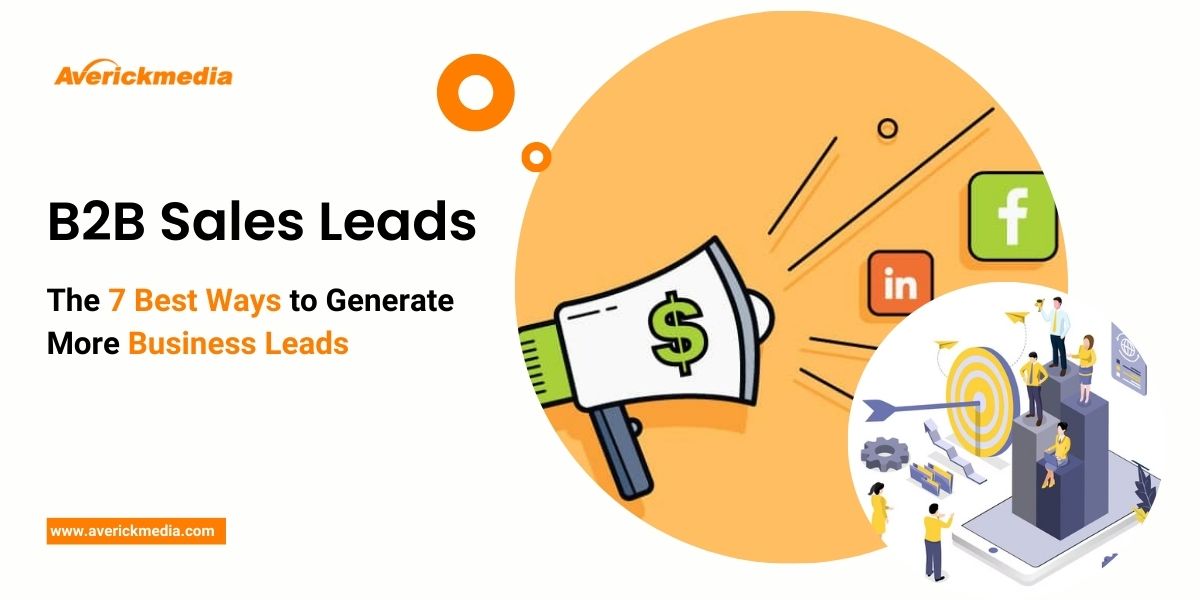Comprehensive Guide to Types of Sales Channels and Selling Your Product Successfully
Sales channels play a crucial role in the success of any product. They serve as the bridge between businesses and customers, enabling the distribution and sale of products to reach the target market effectively. Understanding the different types of sales channels and how to leverage them can significantly impact the success of your product.
In this comprehensive guide, we will explore the various types of sales channels and provide insights into selling your product successfully. Whether you're a small business owner or an aspiring entrepreneur, this guide will provide you with valuable knowledge to make informed decisions about your sales strategy.
So, let's dive into the world of sales channels and explore how you can optimize your approach to maximize your product's reach and sales.
But First, What Are Sales Channels?
A sales channel refers to the pathway or platform through which products or services are made available to customers for purchase. It encompasses the entire process of reaching customers, from product discovery to the final transaction. A sales channel encompasses the entire ecosystem involved in the distribution, marketing, and transactional processes of a product.
Each sales channel represents a distinct avenue or platform where products are made available to potential customers. These channels can vary significantly in terms of their characteristics, target audience, and the level of control exerted by the seller.
Overview Of The Different Types Of Sales Channels
We will delve into three primary categories of sales channels: direct, indirect, and hybrid. Each category has its unique characteristics, benefits, and considerations. Understanding these channels can help you choose the right sales channel that aligns with your product and target market. So, let’s explore these channels and find out how they fit into your business.
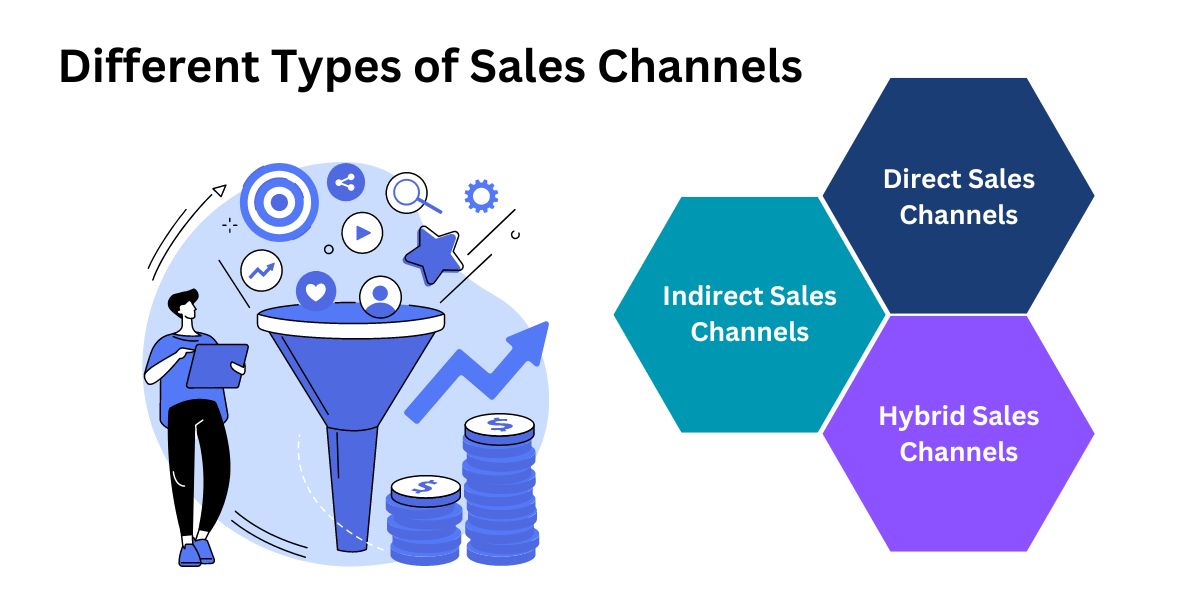
Direct Sales Channels
Direct sales channels refer to the avenues through which businesses directly engage with customers to promote and sell their products or services. These channels involve direct interactions between the seller and the buyer without the involvement of intermediaries. Moreover, direct sales channels provide greater control over brand experience, enabling businesses to ensure consistency and alignment with their brand identity in every interaction. This control allows for the careful presentation of products or services, reinforcing the brand's values and messaging. One key highlight of this type of channel is the greater profit margins. Direct sales channels eliminate the need for intermediaries, which results in businesses retaining a larger portion of the revenue generated from sales to themselves. In 2021, the direct selling industry in the United States saw the participation of more than 50 million individuals. Within this community, there were approximately 7.5 million sellers who engaged in direct selling activities, while the number of buyers and customers reached nearly 45 million.
Examples of Direct Sales Channels –
Retail
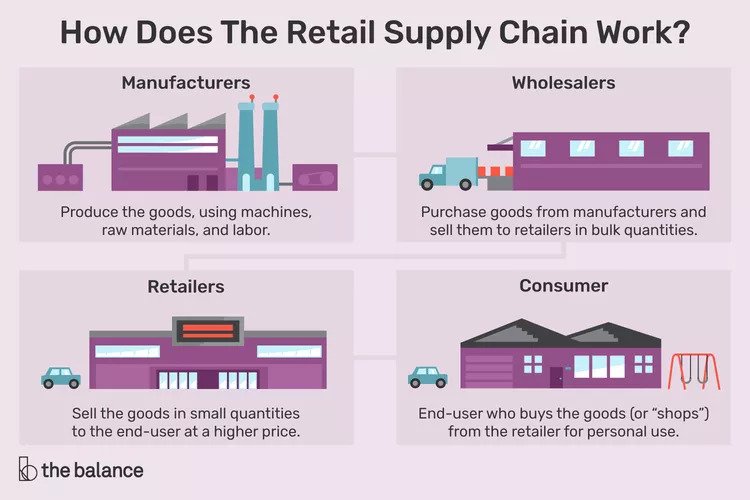
Source: www.reuters.com
Retail refers to the process of selling products or services directly to consumers for personal use. It is a key component of the consumer goods industry and involves the operation of physical stores or online platforms where customers can browse, select, and purchase products. Examples of retail stores can include traditional brick-and-mortar stores, department stores, specialty shops, supermarkets, convenience stores, or online retail platforms. Global retail sales were projected to amount to around 31.7 trillion U.S. dollars by 2025, up from approximately 23.74 trillion U.S. dollars in 2020.
Direct marketing

Direct marketing is a form of advertising that involves directly reaching out to individual customers or target audiences through various channels. It aims to establish a direct line of communication between businesses and potential customers, bypassing intermediaries. Direct marketing strategies can include direct mail campaigns, telemarketing, email marketing, and personalized messaging.
E-commerce
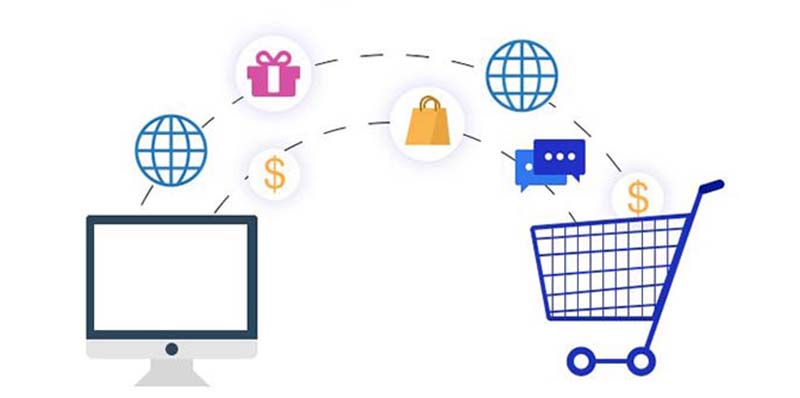
Source: Freshsales
E-commerce, or electronic commerce, refers to the buying and selling of products and services online. It involves conducting online business transactions, typically through dedicated websites or online marketplaces. E-commerce offers numerous benefits, including convenience for customers, a global reach, and the ability for businesses to operate 24/7 without the limitations of physical store locations. According to reports, 95% of all purchases are projected to be done via e-commerce.
Social media
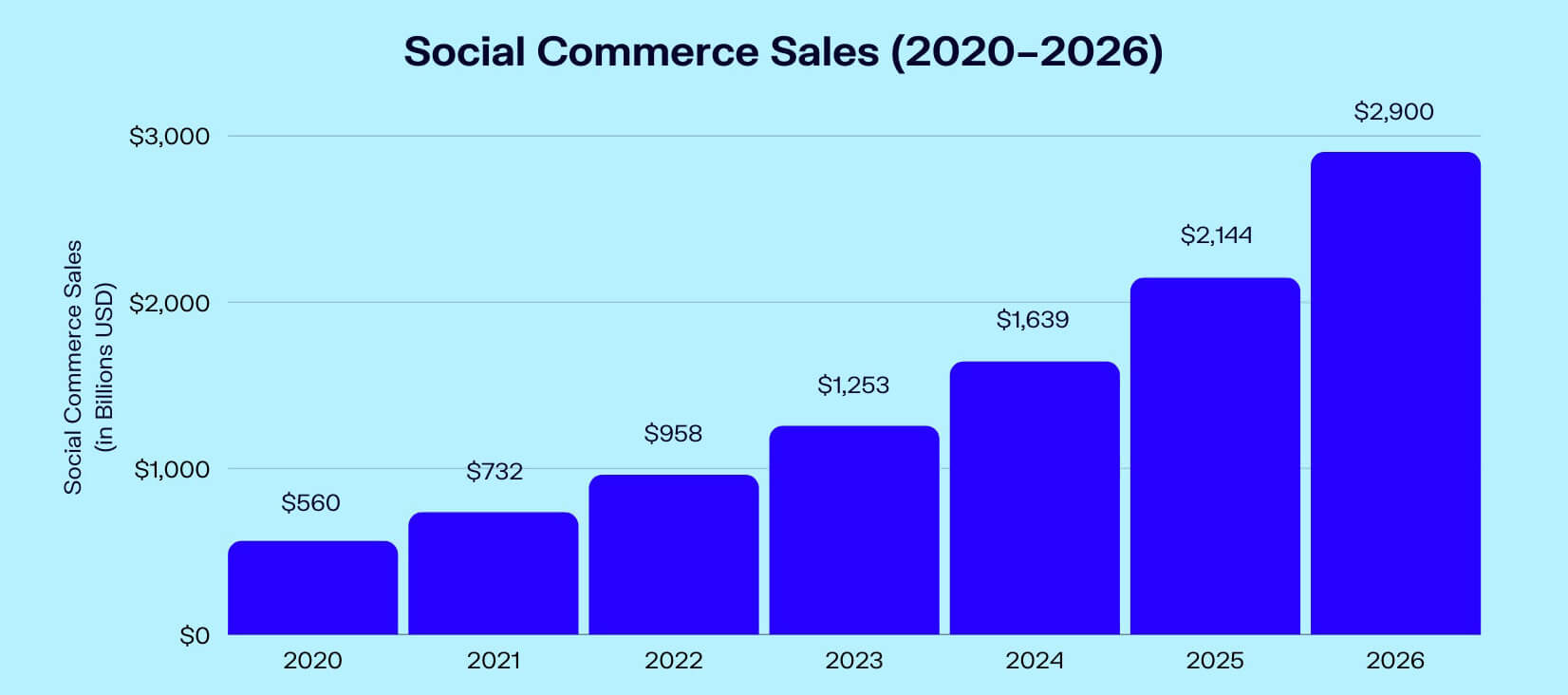
Social media involves online platforms and websites that allow users to upload and share content, as well as engage in social networking. It has become a powerful tool for businesses to connect with their target audience, build brand awareness, and promote products or services. Businesses can leverage social media platforms such as Facebook, Instagram, Twitter, and LinkedIn to engage with customers, run targeted advertising campaigns, and gather valuable insights to inform their marketing strategies. In fact, according to recent research, the social commerce market size is expected to hit $1.3 trillion in 2023. This is huge, considering a 30.8% increase from the previous year.
Online Shopping

Source: Oberlo
Online shopping refers to the process of purchasing products or services through the Internet. It allows customers to browse and select items from various online retailers, add them to a virtual shopping cart, and complete the transaction online. Online shopping offers convenience, a wide range of options, and the ability to compare prices and read reviews, making it a popular choice for consumers worldwide. As of 2023, the global number of digital buyers stands at 2.64 billion, accounting for approximately 33.3% of the world's population. This statistic highlights the significant presence of online shoppers, indicating that approximately one out of every three individuals you encounter is engaged in online shopping activities.
Personal Selling
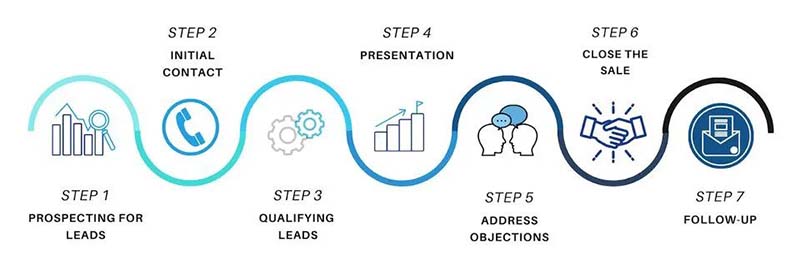
Source: hanghieugiatot
Personal selling is a sales technique that involves direct communication between a salesperson and a prospective customer. It typically takes place in face-to-face interactions, although it can also occur over the phone or through video calls. Personal selling allows for personalized product presentations, relationship-building, and the opportunity to address customer needs and concerns in real-time, making it a valuable tool for businesses in closing sales and building long-term customer relationships.
Showroom
A showroom is a physical space where businesses display their products for customers to view and experience firsthand. Showrooms are designed to showcase the features, quality, and aesthetics of the products, providing a tactile and immersive environment for customers to make informed purchase decisions. Showrooms can be particularly effective for industries such as furniture, automotive, and electronics, where customers value the ability to see and test products before making a purchase.
Industry-Specific Email Lists
Indirect Sales Channels
Indirect sales channels involve the use of intermediaries or third parties to distribute and sell products to customers. These channels provide an alternative approach where businesses leverage the existing infrastructure and reach of intermediaries to expand their market presence.
One of the significant advantages of indirect sales channels is the shared responsibilities between businesses and intermediaries. Intermediaries take on various operational tasks, including inventory management, order fulfillment, and customer support. This relieves businesses of the burden of handling these responsibilities themselves, allowing them to focus on their main competencies, such as product development and marketing. According to Forrester, 75% of the world's commerce is transacted indirectly.
Examples of Indirect Sales Channels -
Wholesale
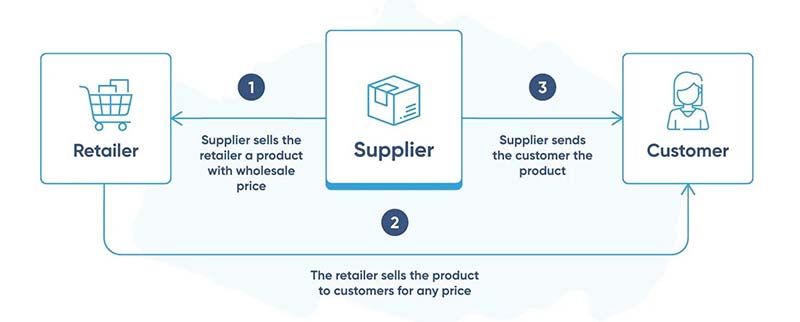
Source: labsnews
Wholesale is an indirect sales channel where businesses sell products in bulk quantities to retailers, distributors, or other businesses rather than directly to end customers. Wholesale transactions typically involve lower per-unit prices due to the larger volume of products being purchased. Wholesalers act as intermediaries between manufacturers or suppliers and retailers, facilitating the distribution of goods on a larger scale and allowing businesses to reach a wide network of retail outlets. The market size, measured by revenue, of the Wholesale Trade industry was $12.1tr in 2022.
Marketplace

A marketplace is an online platform that connects multiple sellers with potential buyers, facilitating the buying and selling of products or services. Marketplaces provide a centralized location where sellers can list their products, and buyers can browse and purchase from a wide range of offerings. These platforms often offer features such as customer reviews, secure payment processing, and logistics support, creating a seamless buying experience for both sellers and buyers.
Resellers
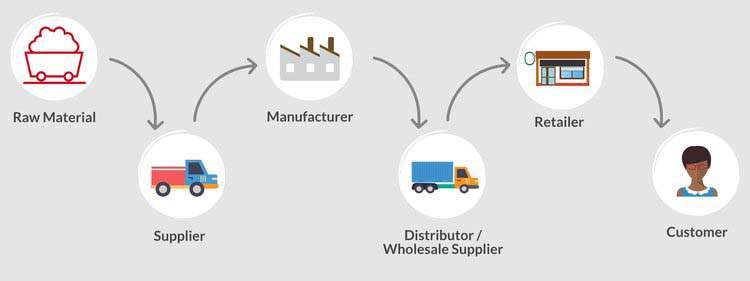
A reseller is an intermediary or business entity that purchases products from manufacturers or wholesalers and then sells them to end customers. Resellers typically operate independently and may have their own distribution networks or sales channels. They add value to the supply chain by providing customers convenience, localized distribution, and specialized knowledge, bridging the gap between manufacturers and end consumers.
Hybrid Sales Channels
Hybrid sales channels combine elements of both direct and indirect sales approaches, allowing businesses to leverage the benefits of multiple channels simultaneously. These channels offer a flexible and adaptable approach to reaching customers and maximizing sales opportunities. This multi-channel approach creates a seamless and consistent omnichannel experience, where customers can research products online, visit physical stores for hands-on interaction, make purchases through various channels, and receive support across different platforms. This flexible and adaptable strategy enables businesses to optimize their sales efforts, cater to diverse customer segments, and deliver an enhanced customer experience.
Examples of Hybrid Sales Channels -
Business-to-consumer (B2C)
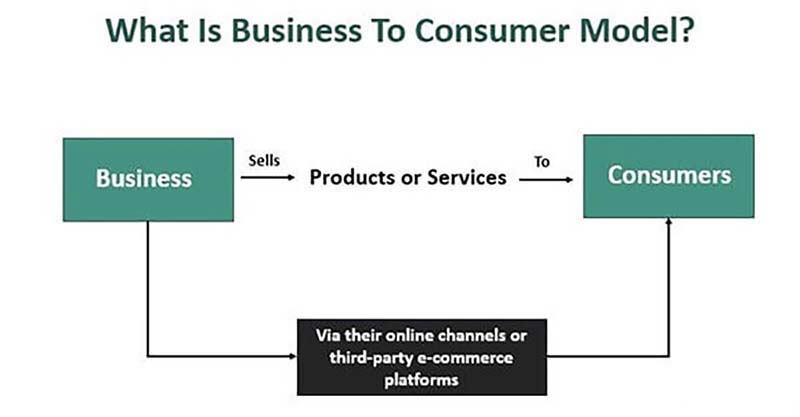
Source: WallstreetMojo
Business-to-consumer (B2C) is a sales channel where businesses market products or services directly to individual consumers. In this channel, the transaction occurs between a business and the end customer without any intermediaries involved. B2C sales channels are commonly seen in retail, e-commerce, and service industries, where businesses focus on meeting the specific needs and preferences of individual consumers. In 2022, the Business-To-Consumer (B2C) eCommerce market reached a substantial value of $5.85 trillion. Furthermore, it is projected to experience a steady growth rate with a CAGR of 9.1% during the period of 2022-2026. This indicates the strong and consistent expansion of the B2C eCommerce sector, underscoring the increasing popularity and significance of online retail for consumers worldwide.
White-label product

Source: wotnot.io
A white-label product is a product or service produced by one company but marketed and sold under another company's brand name. It allows the purchasing company to rebrand and customize the product as its own without having to invest in its development or manufacturing. White-label products offer businesses the opportunity to quickly enter new markets, expand their product offerings, and leverage the expertise and reputation of the white-label provider.
Value-added reseller (VAR)
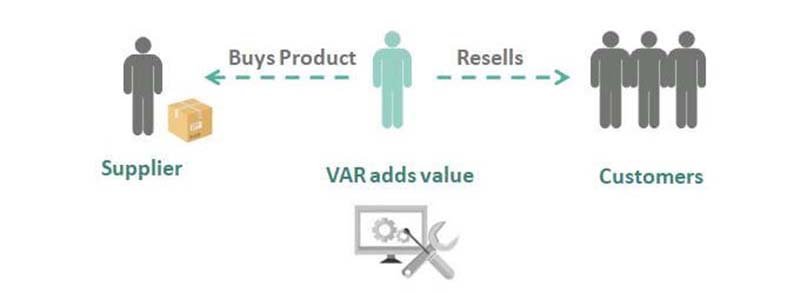
Source: dataintelo
A value-added reseller (VAR) is a company that enhances or modifies existing products or services to provide additional value to customers. VARs typically purchase products from manufacturers or suppliers and then customize, integrate, or bundle them with other offerings to meet specific customer needs. They add value by providing specialized expertise, support, and additional features, making the product or service more attractive and tailored to the customer's requirements.
B2B (Business-to-business)
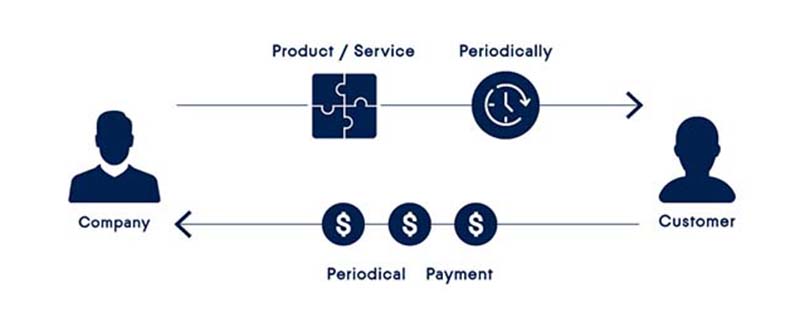
Business-to-business (B2B) refers to a sales channel where businesses market products or services to other businesses rather than individual consumers. In B2B transactions, the focus is on meeting the needs and requirements of the business customers, which often involve larger order volumes and longer-term contracts. B2B sales channels are common in industries such as manufacturing, wholesale, distribution, and professional services.
Sales outsourcing
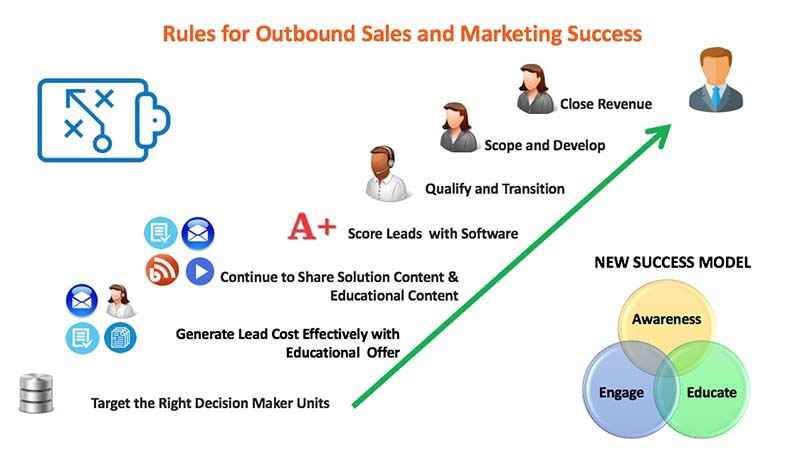
Source: gabrielsales
Sales outsourcing is a business practice where a company entrusts its sales processes and activities to an external organization or agency. This outsourcing arrangement allows the company to leverage the expertise and resources of the outsourced sales team, typically with specialized knowledge and experience in sales and lead generation. This allows companies to focus on their core competencies while benefiting from cost savings, scalability, and access to a broader network of sales professionals.
Recent Marketing Articles
- The Importance of a Targeted Biotechnology Industry Email List
- Generate Business Sales Leads With These Tips
- Best Ways to Generate More Business Leads
- How To Use Data In Marketing?
- Best Healthcare Email Lists Providers
- How ChatGPT Will Affect The Future Of SEO?
- How to Spend Your 2023 Marketing Budget: 5 Ways to Succeed This Year
- 10 Must-Know Tips for Marketing Your Law Firm In 2023
- How Buying B2B Data Helps To Close More Deals?
- 10 Tools That Actually Close More Deals
- How To Find Someone's Email Address: 5 Simple Ways
- Everything You Need To Know About Lead Management
Wrap-Up
Please note that some channels can fall into multiple categories depending on how they are utilized. For example, e-commerce can be considered both a direct and indirect sales channel, depending on whether you are selling through your own website or through an online marketplace. Similarly, B2B can be both an indirect and hybrid sales channel, as it involves selling to businesses but may utilize various intermediaries. It's important to analyze each channel's characteristics, benefits, and considerations to determine how they align with your product and target market.
Exploring and experimenting with different sales channels can be a valuable strategy for businesses seeking growth and increased market reach. By venturing into new channels, you open doors to untapped customer segments, expand your brand presence and discover potential revenue streams. Embracing this mindset of exploration allows you to adapt to changing consumer behaviors, stay ahead of competitors, and uncover innovative ways to connect with your target audience. Remember, each sales channel offers unique advantages and considerations, so don't be afraid to test, iterate, and optimize your approach to find the perfect mix that suits your business goals.


